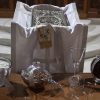Cretan Honey
The honey of Crete. Crete the land of milk and honey, the birthplace of Zeus king and father of the ancient Greek Gods. The people of the island of Crete have domesticated the bee as far back as the Bronze age period successfully.
Melissa the bee in the Greek language, the name of a nymph, as well as the name of one of the Kourites (Melissos) guardian of baby Zeus and founder of the ancient city of Eleftherna.
In mythology the ancient Greek Gods enjoyed honey, ambrosia and nectar, the first bee keeper in Hellenic Mythology was Aristaios son of Apollo and Kyrini.
Aristaios became immortal as Hours and mother earth nourished him with Ambrosia.
We see here that ancient Greeks understood very well the healing powers of honey…
In the Greek language Melissa-Melina-(she who brings the honey) is a name still given to women til this day. Today the bees that we find domesticated are of the Apis mellifica species.
The Cretan honey is renown for its quality its aroma and taste.
Bee hives are found through all out the island from Spring through summer until autumn the bees thrive, wild flowers herbs, chestnut, pine trees and citrus blossoms are a bees paradise!
The Thyme honey is a category on its own alone its aroma and flavor is rich. The Sfakian Honey as well as the Lasithi Honey is famous for its quality.
For centuries honey was the only sweetener in cooking in Greece until sugar was introduced, nearly all sweets, breakfast in Crete involves some variety of honey.
Pollen is also used not only for its substance rich in proteins and therapeutic elements is given to children and elderly on a daily bases.
Propolis the resin collected by bees with its antibiotic attributes used in traditional medicine or remedies.
Aristotle wrote about the bees and honey stating that the hard working bee holds a key to the balance of the Cosmos.
The people of the island of Crete that have very strong earthbound characters understand, watch and learn from nature, one of the favorite gifts a Cretan can offer or receive is good Honey.
Honey with nuts and sheep’s yogurt is a sweet offered to guests and newlyweds!
Phillo pastry with honey and nuts a tiny popular sweet enjoyed through all out Crete. In Crete honey is understood tasted and enjoyed as much as good wine.
The color, the aroma, the texture, the sweetness and how it might enhance types of cheese, bread or traditional dishes …
WeGuide takes you the land of milk and honey Crete, taste the honey of the Gods with us!
Health Benefits of Honey
Its benefits include the following treatments, taken from both traditional and modern medical experts.
Sweetener: It can be used as a substitute for sugar in many food and drinks. It contains about 69% glucose and fructose, enabling it to be used as a sweetener that is better for your overall health than normal white sugar.
Weight Loss: Though it has more calories than sugar when honey is consumed with warm water, it helps in digesting the fat stored in your body. Similarly, honey with lemon juice or cinnamon help in reducing weight.
Energy Source: According to the USDA, honey contains about 64 calories per tablespoon. Therefore, it is used by many people as a source of energy. On the other hand, one tablespoon of sugar will give you about 15 calories. Furthermore, the carbohydrates in it can be easily converted into glucose by even the most sensitive stomachs, since it is very easy for the body to digest this pure, natural substance.
Improving Athletic Performance: Recent research has shown that honey is an excellent ergogenic aid and helps in boosting the performance of athletes. It is a great way to maintain blood sugar levels, muscle recuperation, and glycogen restoration after a workout, as well as regulating the amount of insulin in the body, as well as energy expenditure.
Source of Vitamins and Minerals: It contains a variety of vitamins and minerals. The type of vitamins and minerals and their quantity depends on the type of flowers used for apiculture. Commonly, honey contains Vitamin C, Calcium and Iron. If you check the vitamin and mineral content in regular sugar from any other source, you will find it to be completely absent or insignificant.
Antibacterial and Antifungal Properties: It has anti-bacterial and anti-fungal properties, so it is often used as a natural antiseptic in traditional medicines.
Antioxidants: It contains nutraceuticals, which are very effective for the removal of free radicals from the body. As a result, our body immunity is improved against many conditions, even potentially fatal ones like cancer or heart disease.
Skin Care with Milk and Honey: Milk and honey are often served together, since both of these ingredients help in creating smooth, beautiful skin. Consuming this combination every morning is a common practice in many countries for this very reason.
Honey in Wound Management: Significant research is being carried out to study its benefits in the treatment of wounds and the Nursing Standard explains some of these benefits in wound management in the document.
These have been listed below:
- Honey possesses antimicrobial properties.
- It helps in promoting autolytic debridement.
- It deodorizes malodorous wounds.
- It speeds up the healing process by stimulating wound tissues.
- It helps in initiating the healing process in dormant wounds.
- It also helps in promoting moist wound healing.
These healing powers are not overstated. The Waikato Honey Research Unit provides details about the world-wide research that is being carried out on the benefits of honey in medicine. Furthermore, BBC reported in July of 2006 that doctors at the Christie Hospital in Didsbury, Manchester are planning to use honey for faster recovery of cancer patients after surgery. Such research will provide scientific evidence for the so-called “beliefs” held by honey lovers all over the world and will help in propagating the benefits to more people.
Now that you know the benefits of honey, how do you eat it? You can eat it raw, add it to water or different beverages and you can also add it to several recipes.






